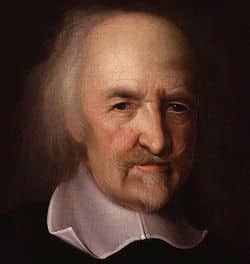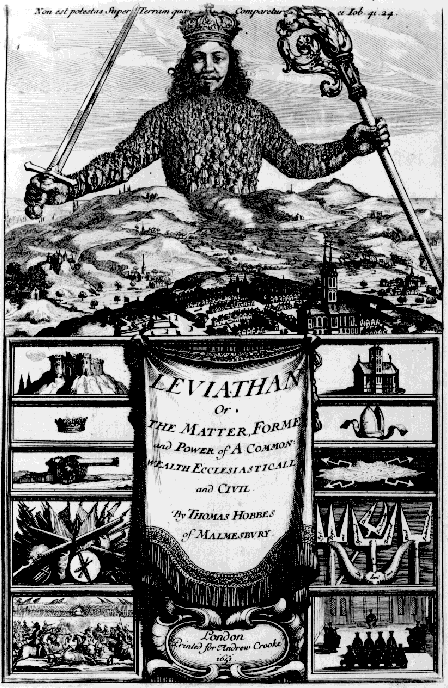Biography
- Born in Westport England, 1588

- Hobbes’ father (a vicar) abandoned the family when Hobbes was young
- Graduated from Magdalen Hall 1608
- Tutor to young William Cavendish, with whom, he travelled through continental Europe
- While spending time in Paris, Hobbes began to consider himself a philosopher
- Wrote The Elements of Law, Natural and Politic while in Britain
- Fled to France after the Parliamentarian victory in
Britain - While in France, he wrote Leviathan (1651)
- Returned to a (forced) partial-retirement in England
after publishing Leviathan - Died in 1679, uttering the words “A great leap in the
dark.”
Leviathan
- An analysis of the structure of society and of legitimacy of government

- On of the first modern examples of the social contract theory, as well as the state of nature
- Was written as a strong supporter of absolutism
- Consists of four parts building onto each other
1. Of Man
2. Of Common-wealth
3. Of a Christian Commonwealth
4. Of the Kingdom of Darkness
Part 1: Of Man
- Outlines the importance of perception for humans
-What is “Good” is simply something that an individual likes, while “Evil” is something that an individual hates. - Hobbes describes man as selfish, greedy and only
concerned with their own survival - Without society, man is a “state of nature” or “war”
- Hobbes outlines three reasons for conflict during a
state of nature: Competition, Diffidence and Glory. - Also highlights Hobbes’ laws of nature:
1. Man should seek “peace”, but can use all rights
while in a state of war.
2. To obtain a state of “peace” an individual must give
up some rights (The Social Contract)
Part 2: Of Commonwealth
- The reason for a commonwealth is “…the introduction of that restraint upon themselves, in which we see them live in Commonwealths, is the foresight of their own preservation, and of a more contented life…”
- Outlines the rights of the sovereign
-Made to protect the sovereign and the state of “peace” - Speculates that there are only three true forms of commonwealth: Aristocracy, Democracy, and Monarchy
-All other versions of such are a matter of perception (e.g. an Oligarchy) - States that a monarchy is the best system because:
-Corruption is less likely because the success of the sovereign is dependent on the success of the people
-It removes morals from decision making (Legal Positivism) - Suggests that taxation should be equivalent to how useful a
person is to the commonwealth
Part 3 & 4: Of Christian Commonwealth and Of The Kingdom of Darkness
- Religion is a matter of the state and sovereign
- It is impossible to tell who truly has a divine right to rule
- Therefore civil power trumps religious power
- “Kingdom of Darkness” is the ignorance of knowledge and misinterpretation of religious text
- Hobbes throws his support behind protestant ideas
- Hobbes scolds the church for it’s denial of sciences
- Only in matters of civil disorder should they be stopped
